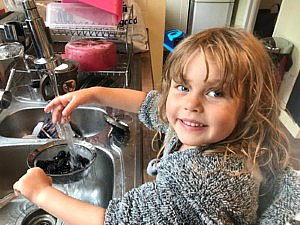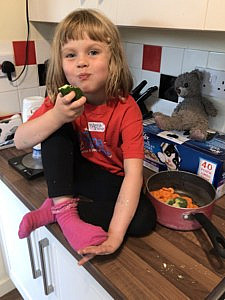Play with your food - cooking with children
The kitchen is said to be the heart of the home, so what an amazing place to make wonderful memories with your children! With all of the complications of the kitchen it may seem counterproductive to let children help out, but Sarah Muir (Ellibee Home Organisation) is here to explain why letting children explore food and help in the kitchen is vital for their development.
Miss P is nearly 4 and loves helping me in the kitchen - it's become our thing! It's our time together to chat, prepare dinner, have fun and learn. It turns out there are so many benefits of involving children in food preparation. Here are our top 4:1. Trying Out New Textures
Miss P's first forays into food fun was messy play! We'd go to messy play groups where there were trays of baked beans and cabbage with dinosaurs hidden underneath or construction toys and cereal! She'd get messy and explore the sight, touch and, most importantly, the taste of these foods. We'd also do messy play at home making pies for monsters with squidgy mashed potatoes or searching for the orange segment treasure in a tray of jelly - it all got put in her mouth! Even now as we prepare dinner she will try new foods and textures. A little while ago we made chicken and vegetable curry with green beans. Miss P's job was to help with the vegetables. She played with the green beans popping out the bean seeds and sneaking some raw courgette as we prepped. We later compared the uncooked textures of the vegetables to the cooked ones and talked about what we preferred. Eating and liking food is linked to repeated exposure. It can take around 10 times of being introduced to a food before a child likes it. What better way of introducing and exploring foods for those first few times than making it fun and messy! Miss P actually didn't like baked beans until she was sat in a big tub of them scooping them in with her hands, despite having them on her plate several times before.2. Opportunities for learning
Cooking is fun for children (and can be for parents too) but there are also many learning opportunities. Here are five of our favourites:- Fine motor skills - cutting (with a blunt knife or kid-friendly scissors), spreading and pouring can all help develop fine motor skills ready for writing and drawing in the future.
- Creative skills - Whether it's coming up with tasty combinations, or making your meal into a work of art, cooking forces you to use your imagination. Miss P's favourite thing at the moment is making pizza faces with different ingredients.
- Numeracy skills - Miss P loves numbers so we use cooking as a way of practising her maths skills. She identifies numbers on the scales (number recognition) and counts out different ingredients as we use them.
- Safety skills - Sharp knives, high heat and germs are the biggest safety factors in the kitchen. When cooking with Miss P I use these as learning opportunities to teach her what she can and cannot touch and why. Not only am I keeping her safe, but showing her the reasoning behind all of the rules means she'll understand what is dangerous.
- Food waste and recycling - Miss P loves being my 'bin lady' when we're preparing food. It's the job she can easily do with little instruction. As a result of this she knows what we put in compost, what goes in general waste and she even has a better idea than Mr Ellibee of what goes in the terracycle or flexible plastic bins!

3. Eating more food
This is probably one of the best benefits of cooking with children - they eat more food! It is scientifically demonstrated that children are more likely to eat food that they prepare themselves. A 2014 study conducted by van der Horst, Ferrage and Rytz and published in Appetite showed that children were 76% more likely to eat salad when they had helped to prepare the meal than if the parents had prepared the meal themselves. This is great news for increasing nutritious eating in children and helping to reduce food waste. When a child takes part in preparing food they feel more control, have more ownership over it and feel a sense of achievement. They want to eat it and they like what they eat. We have definitely noticed this with Miss P. She'll tuck in with vigour when it's something she's been involved with preparing and more often than not she loves the taste and has a good go at eating it! This is great news for reducing food waste. [caption id="attachment_13303" align="alignnone" width="225"] Delicious raw courgette![/caption]
Delicious raw courgette![/caption]
4. Making informed decisions about food
Being part of the meal preparation, whether it's choosing items in the supermarket, selecting what we want to prepare for dinner or deciding how much food goes on the plate helps the child to make their own decisions about food. The other night Miss P was helping me prepare chicken pasta bake and she tried the sauce that we made and decided she would prefer plain pasta with her dinner. As she wasn't having the vegetables that were in the sauce, I gave her the choice of a carrot, tomato and cucumber and asked her to choose which ones she wanted with her pasta. She ate all of her dinner that night because she had chosen it (with restricted options and guidance from me). Guiding young children to make their own choices gives them a sense of control. It has the short-term benefit of increasing the chances they will eat what is on their plate but also has long-term benefits that will set them up for making nutritious and waste-free choices in the future. Miss P and I love cooking together. Our favourite things are making smoothies (a great way of using leftover fruit) and making homemade pizzas. Cooking makes room for many conversations about food and other everyday things and the fact its fun and reduces food waste is a big bonus! What will you cook with your little ones?It's National Organising Week 2019 and APDO's 15th birthday celebration! We would love for you to join in the fun by following us on our social media channels. If we've inspired you, please tag us on social media with our hashtag #NOWorganise so we can see what you've been up to!
